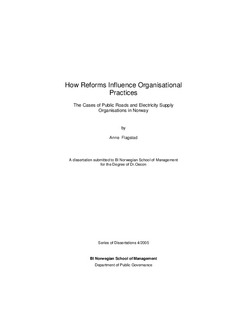How Reforms Influence Organisational Practices: The Cases of Public Roads and Electricity Supply Organisations in Norway
Doctoral thesis
Permanent lenke
http://hdl.handle.net/11250/94316Utgivelsesdato
2005Metadata
Vis full innførselSamlinger
Sammendrag
With respect to how radical transformation of organisational practices a reform objective presuppose, both moderate and radical public management reforms can be identified. In addition, both radical and more limited transformations of organisational practices can be identified. This puzzle addresses a classic problem in institutional organisation research. This problem is how micro and organisational level processes, and processes in the larger institutional environment are bridged during organisational transformation. To address this problem is the relationship between different reforms, changes in organisational ideology, and transformation of organisational practices explored over time.
These relationships are explored in two sectors and in three studies. In the cautious mover context of Norway, organisational transformation in the public sector meant mostly moderate reforms. One exception is the 1991 liberalisation of electricity supply to consumers. A typical example of a moderate reform is the 1993 quasi-market reform in public roads. The first study is a longitudinal case study of how the implementation of a new organisational form that was forced on the Directorate of Public Roads actually did transform its practices. The second study is a cross-sectional quantitative analysis of changes in organisational ideology and variations in operational practices in electricity supply organisations. The third study is a cross-sectional quantitative analysis of the relationships between different reforms and strategic practices in the public road and electricity supply organisations. The overall conclusion is that organisational transformation is in both its development and effects, related to the benefits of institutionalisation processes within organisations. The directed process approach is introduced as an alternative institutional approach for the analysis of organisational transformation. Finally, the suggested concept of practical drift may represent a mechanism from which relationships that increase the transformation potential in institutionalisation can be identified.
Serie
Series of Dissertations4/2005
